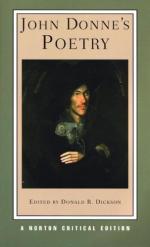|
This section contains 9,416 words (approx. 32 pages at 300 words per page) |

|
SOURCE: Trevor, Douglas. “John Donne and Scholarly Melancholy.” Studies in English Literature 40, no. 1 (winter 2000): 81-102.
In the following essay, Trevor examines Donne's lifelong melancholy, or depression, as an integral part of his religious beliefs.
Donne is in a sense a psychologist.
—T. S. Eliot
Throughout his life, John Donne's prose and poetry are filled with references to, as well as accounts of, his self-understanding as a melancholic.1 If we take his self-professed depressive tendencies as seriously as his devotional meditations, we find that the two are interlinked: Donne often describes ecstatic religious experience with the same metaphors of earthly instability and material metamorphoses he uses to catalogue his melancholic, self-destructive inclinations. Like Søren Kierkegaard, who will praise Christian belief in part because it entails great suffering, Donne is inclined to equate unhappiness with spiritual redemption.
Modern thinkers interested in depression have often commented on the circular nature...
|
This section contains 9,416 words (approx. 32 pages at 300 words per page) |

|


